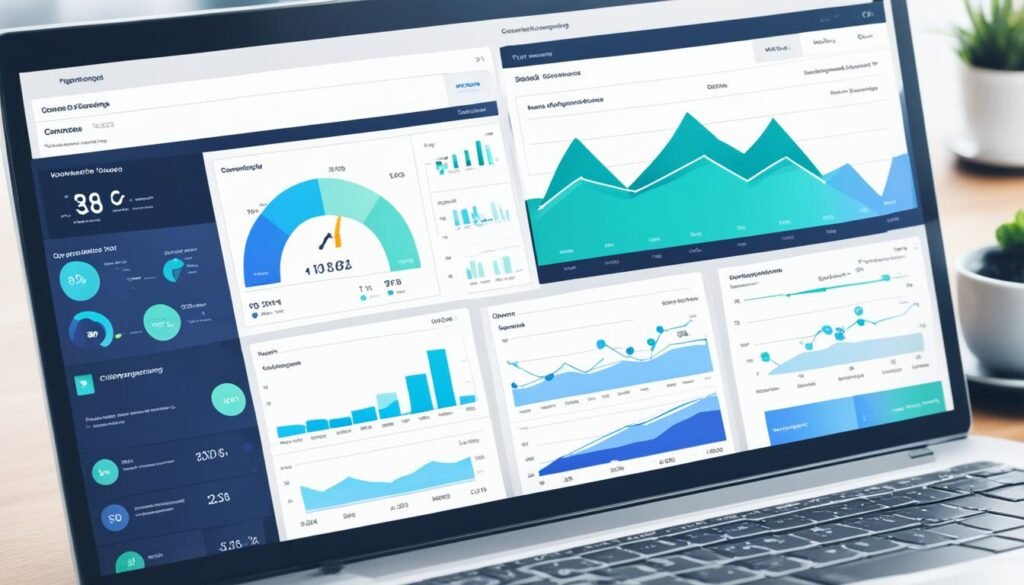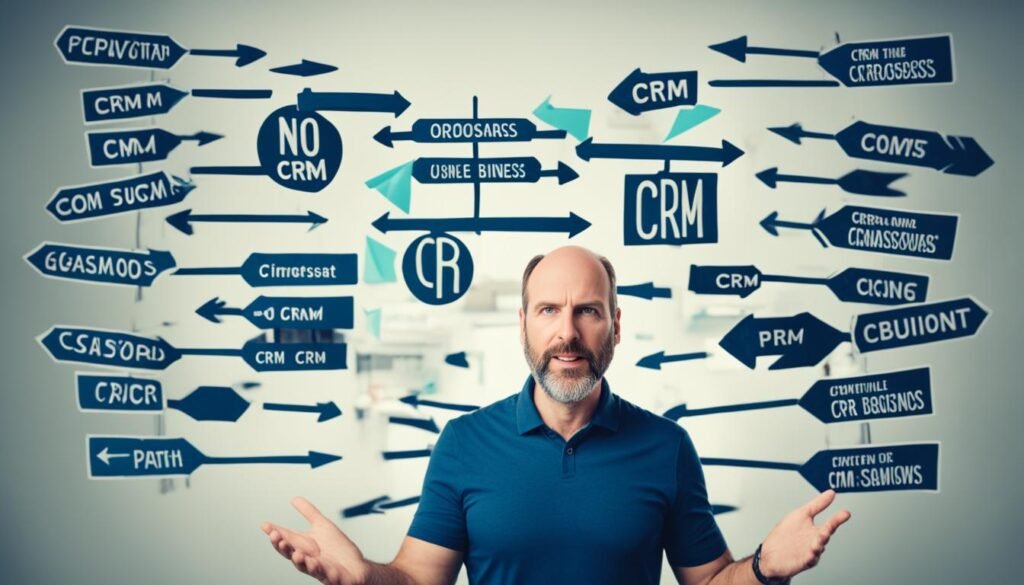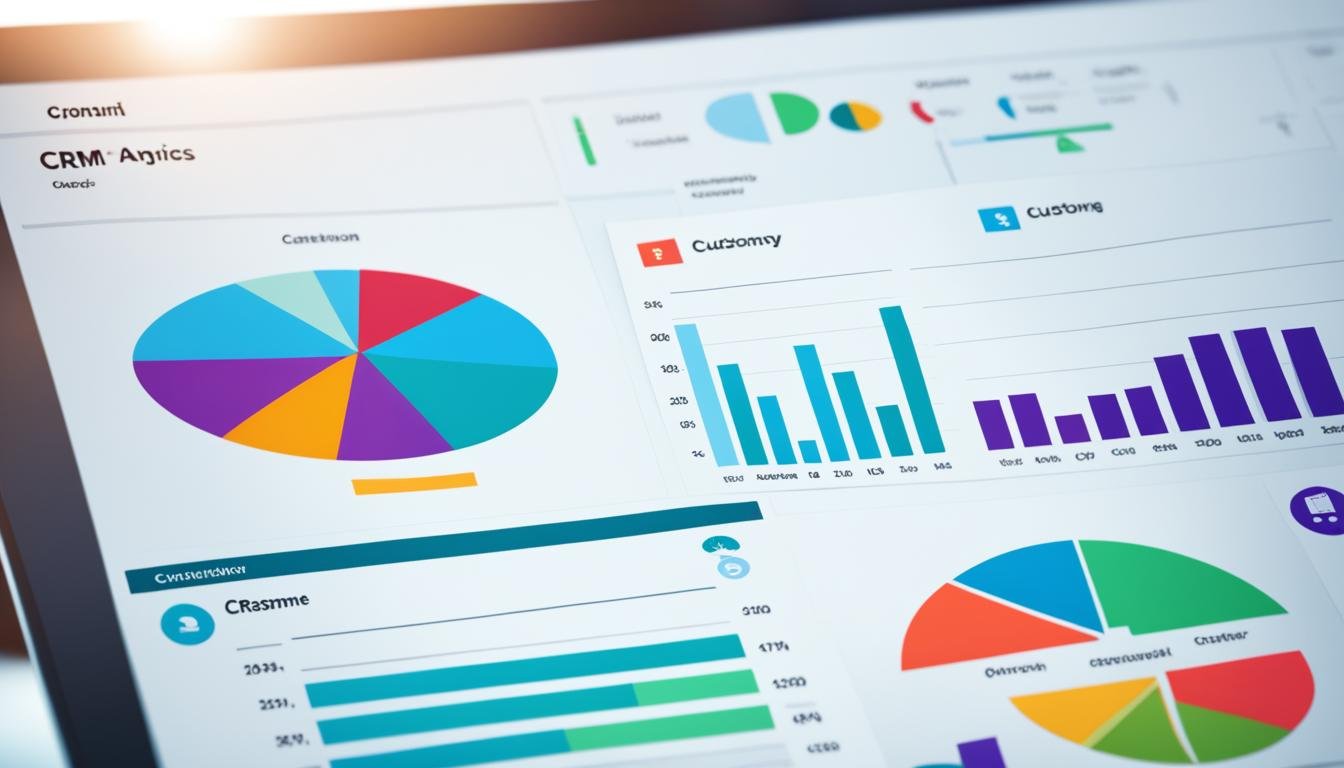Choosing the Right CRM software was first made to help businesses keep in touch with customers. Now, it’s a powerful tool for managing sales, marketing, and more. CRM helps find new customers, keep up with them, and keep them coming back. It stores important info to help sell more and support customers well.
For small business owners, picking the right Choosing the Right CRM software is key. It can make your business run smoother, improve customer experiences, and help you grow. We’ll show you how to find the best CRM for your business in this article.
Table of Contents
Understanding Choosing the Right CRM Software and Its Benefits
What is CRM Software?
Choosing the Right CRM software helps small businesses manage their customer data better. It lets businesses keep track of customer info, find new leads, and manage marketing. In short, CRM software makes it easier to handle customer data, helping businesses grow and sell more.
Key Advantages of Choosing the Right CRM for Small Businesses
Choosing the Right CRM offers big benefits for small businesses. It helps sales and customer service teams work better. CRM also strengthens customer connections and finds new ways to market to them.
- Improves customer data management, making it easier to keep track of important details.
- Makes sales and marketing tasks automated, giving employees more time for other tasks.
- Provides insights through reporting and analytics, helping make better decisions.
- Increases customer satisfaction and loyalty, leading to more repeat business.
85% of people say CRM improves customer experiences. The CRM market is growing fast, expected to hit $131.90 billion by 2028. Small businesses can’t ignore the benefits CRM offers.
| CRM Feature | Benefit |
|---|---|
| Lead Management | Makes the sales process smoother and boosts conversion rates. |
| Marketing Automation | Improves customer engagement and makes marketing more personal. |
| Reporting and Analytics | Offers insights for making informed decisions. |
Understanding CRM software and its benefits helps small businesses choose the right tool. This supports their growth and strengthens customer relationships.

Determining Your Business Needs and Goals
Choosing the right CRM software for your small business is key. First, identify your specific needs and challenges. This might include making your sales and marketing smoother, personalizing customer experiences, or filling your sales pipeline.
Identify Challenges and Pain Points
Start by looking at your current business operations. Find areas where things are tough or not efficient. Issues with managing leads, customer relationships, or seeing your sales pipeline are common. Knowing these problems helps you figure out what you need from a CRM system.
Set Clear Objectives for CRM Implementation
After spotting your business challenges, set clear goals for your CRM implementation. Do you aim to boost customer engagement, automate sales pipeline management, or get deeper insights into your performance? Having specific, measurable goals will help you pick the CRM features that fit your business requirements.
| Objective | Desired Outcome |
|---|---|
| Streamline sales process | Increase sales productivity by 20% within the first 6 months |
| Enhance customer experience | Improve customer satisfaction scores by 30% by the end of the year |
| Improve data-driven decision making | Reduce the time to generate key reports by 50% |
“As cloud becomes the norm for CRM, applications and microservices will proliferate, allowing businesses to reduce the complexity and cost of technology without sacrificing functionality,” Deloitte states.

This image from freepik
By clearly defining your business needs and goals, you’ll be ready to pick a CRM solution that tackles your specific challenges and supports your growth.
Choosing the Right CRM for Your Small Business Needs
Finding the perfect CRM for your small business is crucial. It’s important to know what your business needs and find a CRM that fits those needs. Look at CRM selection criteria and CRM comparison to pick the right industry-specific CRM for your business.
Here are key factors to consider when picking a CRM for your small business:
- Understand your business needs: Clearly define the challenges you’re trying to address, such as lead management, sales automation, or customer engagement.
- Assess required features: Determine the essential functionalities your CRM must have, such as contact management, pipeline tracking, or marketing automation.
- Ensure seamless integration: Select a CRM that can integrate with your existing software and systems, streamlining your workflows.
- Prioritize scalability: Choose a CRM that can grow alongside your business, accommodating your future needs and avoiding costly transitions.
- Consider deployment options: Evaluate web-based, cloud-based, or on-premise CRM solutions to find the best fit for your IT infrastructure and budget.
- Analyze vendor reputation: Investigate the provider’s track record, customer support, and long-term viability to ensure a reliable partnership.
- Understand pricing structures: Carefully review the CRM’s pricing model, including any hidden costs or additional expenses.
- Prioritize user-friendliness: Select a CRM with an intuitive interface to encourage widespread adoption and optimal utilization.
By carefully looking at these CRM selection criteria, you’ll find the perfect CRM for your small business. The right CRM can greatly increase your revenue, sales productivity, and customer satisfaction. So, choose wisely to meet your unique industry-specific CRM needs.

“The right CRM system can be a game-changer for small businesses, driving growth, improving customer relationships, and streamlining operations.”
Essential Features to Look for in a CRM Solution
When looking for CRM software for your small business, it’s key to find the must-have features. These include lead management, sales automation, marketing automation, and strong reporting. The right CRM can make your workflows smoother, boost customer interaction, and help you make better business choices.
Lead Management and Sales Automation
Lead management and sales automation are key in a CRM system. You should find tools that help you track, score, and grow leads. They should also automate tasks like follow-ups and assignments. This can make your sales team work better and increase the number of leads turned into customers.
Marketing Automation and Customer Engagement
Marketing automation and tools for engaging with customers are vital in a CRM. Look for features that let you send personalized messages, run automated campaigns, and keep track of customer interactions on email, social media, and live chat. This can make customers happier and improve your marketing results.
Reporting, Analytics, and Dashboards
Having strong reporting, analytics, and dashboard tools is crucial for making smart decisions. A good CRM should give you real-time insights into your sales, marketing, and customer behavior. This helps you make informed choices and improve your strategies.
By focusing on these key CRM features, you can pick a solution that meets your small business needs. It will help you streamline operations, improve customer relationships, and support long-term growth.
“CRM software is a strategic tool for managing customer relationships effectively, with 86% of businesses considering it essential for their operations.”
Evaluating CRM Vendors and Pricing Models
For small businesses, picking the right CRM vendors and understanding their costs is tough. But it’s key to finding a CRM that fits your business needs and budget.
Compare Key Features and Capabilities
When looking at CRM vendors, check their main features and what they offer. Make sure they match your business goals, like managing leads, automating sales, and providing strong analytics. This way, you can find the best value for your money.
Understand Pricing Structures and Cost Considerations
CRM prices vary a lot, with some offering different plans based on user numbers or features. It’s important to know the pricing and any extra costs for setup, training, or connecting with other tools. This helps you pick a CRM that fits your budget.
| CRM Vendor | Pricing Plans | Key Features |
|---|---|---|
| Pipedrive | 4 customizable plans | Lead management, sales automation, reporting |
| Trello | Free basic plan, paid plans for additional features | Project management, team collaboration, automation |
| Google Sheets | Free with Google account, paid Google Workspace plans | Spreadsheet-based CRM, integration with G Suite |
| Notion | Free individual plan, paid team plans | All-in-one workspace, customizable CRM features |
| ClickUp | Free plan, paid plans for advanced features | Task management, project planning, collaboration |
| Oracle NetSuite | Pricing available upon request | Enterprise-level CRM, ERP, and financial management |
“It’s crucial to choose a CRM that integrates seamlessly with existing tools in a company’s tech stack for optimal performance.”
Choosing a CRM takes about 13 weeks for most businesses, and now 40% are cloud-based. But, 63% of CRM implementations don’t meet expectations, showing how important a careful evaluation is.
When picking CRM vendors and their pricing, consider getting outside help for the tendering process. It might cost more, but it’s worth it to get the best quotes and find the right CRM for your business.

This image from freepik
Choosing the Right CRM
Finding the right CRM software is key for your small business to improve customer interactions and grow. After looking at your options, it’s time to ask for demos and try them out for free. This lets you see how the software works and the support it offers.
Request Demos and Free Trials
CRM demos and free trials let you see the software in action. You can check out its interface, how it works, and if it’s easy to use. This is a big help in choosing the right CRM for your business.
- Join live demos to see the CRM’s features and ask questions about how it works with your business.
- Use free trials to test the CRM with your own data and see if it fits your business well.
- Have your team try out the CRM demos and trials to get their feedback and see if they’ll use it.
Assess User Experience and Customer Support
It’s not just about what the CRM can do. You also need to look at how easy it is to use and the support you get from the company. These things can really help your CRM work well for your business in the long run.
| Criteria | Importance |
|---|---|
| CRM User Interface | The CRM’s user interface should be easy to use and look good, so your team can pick it up fast. |
| CRM Customer Support | Good customer support is key for solving problems or answering questions as you use the CRM. |
| CRM Training and Resources | Look at the training and resources the company offers to make sure your team can use the CRM well. |
By asking for demos, trying out free trials, and checking the user experience and support, you can pick the best CRM for your small business. This way, you’ll make a choice that really fits your business’s needs.
Tips for a Successful CRM Implementation
Starting a new CRM system can be a big change for small businesses. To make it a success, follow these best practices:
- Develop a Clear Implementation Plan: Make a detailed plan that lists the project timeline, what you need, and important steps. This keeps the CRM rollout organized and structured.
- Provide Thorough Training: It’s key to train employees well for them to use the CRM. Offer training that covers how to use the CRM, manage data, and get reports.
- Communicate the Benefits: Tell your team how the CRM will help. Explain how it will make things easier, improve customer service, and boost productivity.
- Provide Ongoing Support: Keep helping your team with the CRM to get the most out of it. Have CRM experts or super-users help and encourage everyone to use it fully.
By doing these things, small businesses can make CRM implementation smooth and valuable.
| CRM Provider | Starting Price | Free Trial Period | Key Features |
|---|---|---|---|
| Salesforce | $25 per user/month | 30 days | Lead management, sales automation, marketing automation |
| HubSpot | Free; $15 per user/month (annual) | 14 days | Pipeline management, marketing automation, reporting |
| Pipedrive | $14 per user/month (annual) | 14 days | Sales pipeline, deal management, workflow automation |
| Creatio | $25 per user/month | 14 days | Customer service, marketing, sales force automation |
Up to 70% of CRM systems don’t meet what people expect, costing a lot of money and time. To avoid this, focus on your team and how things work first. Then, pick the right CRM to support your needs.
“It’s essential to assess and prioritize organizational needs before purchasing CRM software to ensure a successful implementation.”
Getting users involved in picking the CRM and writing down what you need helps make it work better. Also, seeing CRM demos and checking references can help you choose the right system for your business.
Conclusion
Choosing the right CRM system is key for small businesses. It helps improve customer relationships, make operations smoother, and drive growth. By knowing what your business needs, looking at CRM features and vendors, and following best practices, you can pick a CRM that fits your needs and adds value over time.
The CRM selection process means looking at your business challenges and goals. You need to see the benefits of CRM software and find features that match your needs. Think about mobile access, data security, support from the vendor, and how well it integrates with other systems. This ensures a smooth and effective CRM setup.
Using reviews from users, industry reports, and research platforms can give you insights. This helps you pick a CRM that suits your small business well. With the right CRM, you can see better customer engagement, more efficient sales, better marketing, and smoother operations. These are key for growing and succeeding in today’s competitive market.




One Comment on “How to Choosing the Right CRM for Your Small Business Needs 2024”